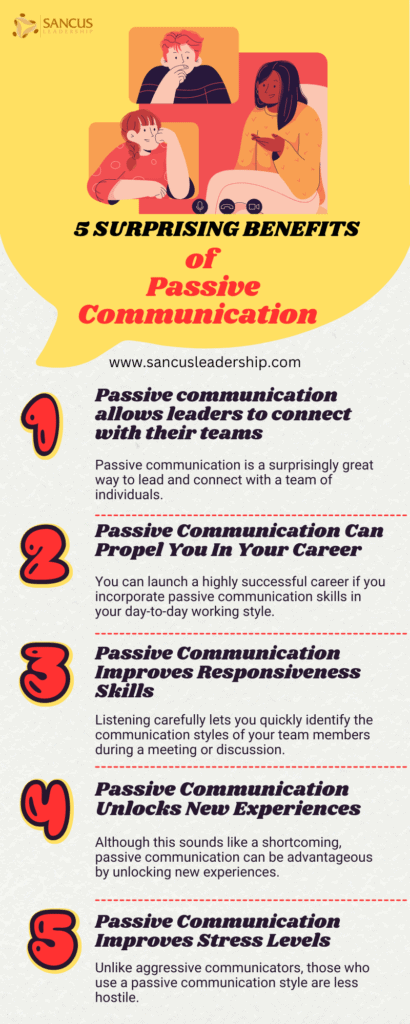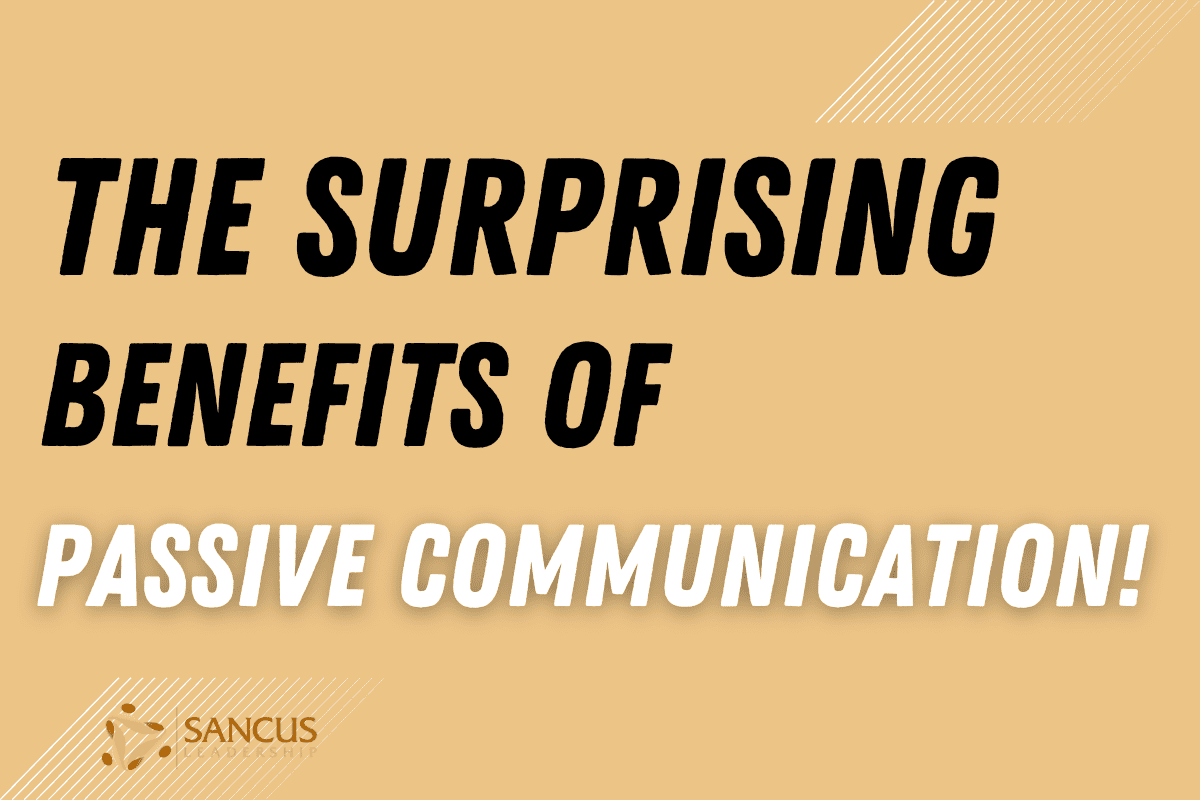There is a misunderstanding that passive communication can be detrimental in various life situations, including work. However, many people may need to realize its surprising benefits.
The benefits of passive communication include building listening skills, encouraging others to speak up, and creating a more easy-going team environment. People who use passive communication often help steer group discussions from becoming tense and avoid violent situations.
This article will explore the various surprising benefits that passive communication can have at work and in life. Let’s get started.
What is really the importance of language in small team leadership?
Why Is Passive Communication Important?

Understanding the importance of a specific communication style before evaluating hidden benefits is crucial.
A passive communication style is vital in team settings since it allows you to hear new ideas from others in the group. It helps to ease the workload by having someone else take control. Also, it aids in building listening skills and supports personal growth.
Passive communication is associated with not expressing opinions openly, keeping to oneself, and often following others rather than taking the lead in various situations. Some may argue that it is not preferred over an aggressive communication approach.
However, achieving common goals as a team is difficult if everyone has an aggressive working style.
For example, planning an activity with a small group of friends can become problematic if no one is easy to get along with. Nothing will get done if no one agrees with other people’s ideas.
Even if you have an aggressive communication style, it is crucial to be aware of it so that you can sometimes be passive on purpose and give others in a group a chance to take the lead.
As a passive communicator, others may feel safe and easy to bring new ideas to for input or feedback since you take time to hear them out and offer a non-aggressive approach.
Passive communication is often considered inferior, which is far from the truth as it has some surprisingly great benefits. Below, we will explore a few of them.
Passive communication is often considered inferior, which is far from the truth as it has some surprisingly great benefits.
1. Passive Communication Allows Leaders to Connect with Their Teams

Passive communication is a surprisingly great way to lead and connect with a team of individuals.
A common misconception in business is that leaders must have an aggressive communication style when managing and leading a team.
However, a passive communication style can help your team members by:
- Creating a psychologically safe environment to speak up
- Allowing different ideas to be presented
- Enabling growth in various roles
- Allowing others to showcase their leadership skills
As a passive leader, you can step back to analyze how individuals behave on your team and only intervene at the right time. This way, you will primarily have a conflict resolution role.
Additionally, it can help you determine which team members are better suited for which roles.
2. Passive Communication Can Propel You In Your Career

Surprisingly, you can launch a highly successful career if you incorporate passive communication skills in your day-to-day working style.
Many business consultants will advise you to constantly speak up in meetings and actively participate in group projects to get noticed by top corporate leaders. However, passive communication skills can help you excel in your career by demonstrating an effective managerial style, such as:
- Compromising
- Being selfless
- Avoiding unnecessary conflict
- Maintaining a professional tone
- Presenting compassion and openness to different opinions
| Effective managerial style | Description |
| Compromising | preventing or avoiding conflicts that are not necessary or beneficial to anyone by practicing effective communication and problem-solving skills. |
| Being selfless | Showing concern for others without expecting anything in return, being willing to prioritize the needs and well-being of others over your own. |
| Avoiding unnecessary conflict | Preventing or avoiding conflicts that are not necessary or beneficial to anyone by practicing effective communication and problem-solving skills. |
| Maintaining a professional tone | Communicating with others in a formal and respectful manner, even in difficult or challenging situations, without allowing emotions to interfere. |
| Presenting compassion and openness to different opinions | Showing understanding and empathy towards others’ feelings and opinions, even if they differ from your own, and being willing to listen and consider different perspectives. |
Creating a positive team environment lets leaders see you as someone they can rely on to keep the peace in a group setting and the necessary work completed.
Creating a positive team environment lets leaders see you as someone they can rely on.
3. Passive Communication Improves Responsiveness Skills

Passive communication surprisingly makes you more responsive to various work and life situations.
Listening carefully lets you quickly identify the communication styles of your team members during a meeting or discussion. If you manage the team, you can lead a discussion but remain passive to allow others to provide input.
As a team member looking on, if more colleagues contribute, you can use this opportunity to follow their lead. It is only sometimes necessary to provide an idea, and a team is optional to accept your idea for you to be seen as a successful contributor.
Passive communication is also practical when a situation becomes violent. Using related skills can de-escalate an argument and prevent things from getting worse.
Regarding responsiveness skills in a work environment, passive communication can keep things moving in a fast-paced environment. This includes when quick decisions need to be made, and workers need to be on board with a process promptly with few questions asked.
Passive communicators are also great at keeping the peace in their home environments. Only some arguments need to be won, whether with your siblings or in a romantic relationship.
4. Passive Communication Unlocks New Experiences

One attribute of passive communication is the inability to say “no” to others.
Although this sounds like a shortcoming, passive communication can be advantageous by unlocking new experiences.
I can remember times when I wanted to say “no” to someone’s request but ultimately felt glad that I did not. Here are a few examples:
- Attending large events
- Taking on a new project
- Flying to a new destination
- Meeting someone new
When someone asks you to do a challenging task, carefully consider their request before refusing it. Many times, these challenges can turn into rewarding experiences with positive results, such as:
- Learning something new
- Crossing off an item on your bucket list
- Making a new friend or work connection
5. Passive Communication Improves Stress Levels
Passive communication offers a healthier lifestyle with low-stress levels.
Unlike aggressive communicators, those who use a passive communication style are less hostile. Therefore, they experience less physical and mental stress.
Some stressful situations that passive communicators usually avoid include the following:
- Making too many unnecessary decisions
- Voicing strong opinions
- Engaging in arguments
Passive communicators know engaging with other individuals is mentally and physically challenging, which could temporarily raise your blood pressure and create unnecessary anxiety.

Here’s a video of a TED Talk that discusses the importance of effective communication.



